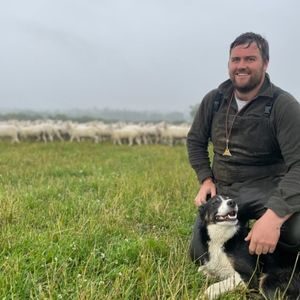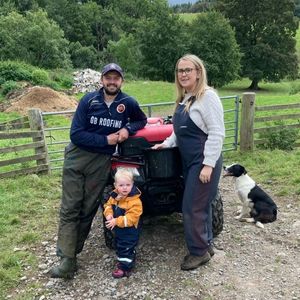Exploring Alternatives To Farm Ownership With SAYFC
22 March 2023In coordination with the Scottish Association of Young Farmers, FAS put on several meetings to explore different routes into agriculture for those whom land ownership through inheritance or purchase were not available options.
Headlining the event alongside representatives from the Scottish Land Matching Service and Johnston Carmichael Chartered Accountants, were three inspiring young farmers who shared their story:

Clarke Hibbard – Sittyton Farm, Newmachar
Clarke described his first steps into farming starting as an employed farmworker on a beef and sheep farm before moving onto self-employment offering agricultural labouring services to several farm businesses. During this period Clarke used his employment to fund his own flock, grazing them on seasonal lets across several locations and amassing a rather hefty fuel bill. The opportunity to apply for a 5 year SLDT tenancy at Sittyton presented itself and having been successful in their application Clarke now runs 1000 ewes between his tenancy and seasonal lets and was shortlisted in the British Farming Awards New Entrant category in 2021.

Stuart and Chloe Graham – Upper Cleuch Farm, Lockerbie

From their beginnings as seasonal tenants at multiple locations across Dumfries and Galloway they now run 550 ewes at Upper Cleuch and contract farm a further 360 locally. This is in conjunction with rearing 170 dairy heifers on a B & B Basis and acting as a growing unit for 200 Innovis ram lambs.
Mark Donald – Rhynaclach, Port of Menteith
Mark secured the tenancy on this Forestry Commission Starter Farm in 2013. Mark now runs 300 ewes and 15 breeding cows alongside 2 contract farming operations where he manages 730 ewes and 120 breeding cows. This all arose from small beginnings (5 orphan lambs) and the desire to obtain more security after nearly being forced to disperse his flock after being unable to renew a seasonal lease. Mark now uses his experiences when undertaking his duties in chairing the NFUS regional Forth & Clyde committee

Top Tips & Takeaways
- Persistence is key – ‘Shy boys get nowt!’
- Use initial knockbacks to strengthen your resolve and try, try again!
- Opportunities do not just fall into your lap, efforts must be made to search them out.
- Step out of your comfort zone! Do not be afraid to look into new areas/locations to find opportunities.
- Don’t be too rigid with your own views and be prepared to be adaptable and compromise to foster a strong working relationship with landlords.
- Diversify your income to make your business more resilient. Consider short term cash crops (store lambs, B & B cattle) to maintain cashflow throughout the year until stocking numbers can be maximised.
- Public perception is important – use social media to not only identify opportunities but to demonstrate due diligence in farming activities showcasing yourself as an attractive candidate for landowners looking for new entrants for their tenanted holdings.
Support is Available through the Scottish Land Matching Service
The SLMS acts as a matchmaking service between those seeking opportunities to farm and those looking to offer opportunity.
Representatives from the Scottish Land Matching service took the opportunity to explain their function offering free independent advice and facilitation to those considering options for joint ventures in farming.
Prospects can be viewed on the SLMS website Scottish Land Matching Service. If you’re interested, we would recommend contacting SLMS directly by either phone (07741 902648) or email slms@nfus.org.uk. This will help them better match you with suitable opportunities.
Accounting Advice for New Entrants
- Start writing your business plan early, not the week before a tenancy application window closes.
- A business plan should be a working document and should regularly be revisited and not just filed when it has served its purpose of securing finance/a tenancy.
- Cashflows which have been completed should regularly be reviewed to monitor financial performance and can provide an early warning system when things haven’t gone according to plan.
Sign up to the FAS newsletter
Receive updates on news, events and publications from Scotland’s Farm Advisory Service
